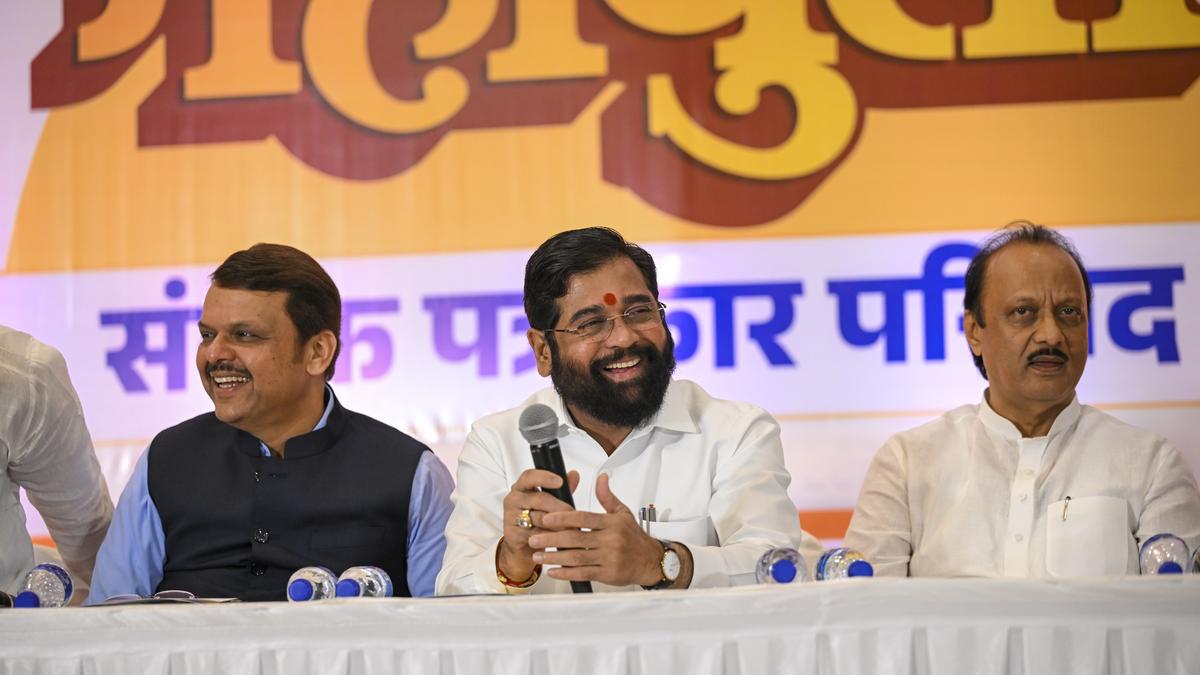Maharashtra Chief Minister Eknath Shinde flanked by Deputy Chief Minister Ajit Pawar and Devendra Fadnavis during a press conference in Mumbai.
| Photo Credit: Emmanual Yogini
Maharashtra was one of the States that contributed substantially to the Bharatiya Janata Party (BJP)’s setback in the Lok Sabha elections, held four months ago. Now, Assembly elections are scheduled to be held on November 20 in the State.
Maharashtra Assembly elections: Full coverage
The rivals
The incumbent alliance, called the Mahayuti, consisting of the BJP, the Shiv Sena led by Eknath Shinde, and the Nationalist Congress Party (NCP) led by Ajit Pawar, will expect to improve its performance. The Mahayuti government has rolled out a number of welfare schemes, which it has been aggressively publicising for the last few months.
The rival coalition group, called the Maha Vikas Aghadi (MVA), comprising the Congress, the NCP led by Sharad Pawar, and the Shiv Sena (Uddhav Balasaheb Thackeray), expects to repeat its performance from the Lok Sabha elections. The MVA has held the BJP responsible for splitting two main parties of the State — the Shiv Sena and the NCP — into two parties each.
In a survey conducted between September 21, 2024, and October 6, 2024, Lokniti-Centre for the Study of Developing Societies and the MIT-School of Government (MIT-SOG) sought to gauge the views of the public about the performance of the Mahayuti government led by Eknath Shinde, which recently completed two years in power, compared to the performance of the previous MVA government, led by Uddhav Thackeray. It also sought to tap the mood of voters in the State on various crucial issues that are bound to be central to the election campaign. The purpose was not to make any vote projections, but to understand what factors may impact voters’ choice. It is quite clear that voters are not swayed by either of the two coalitions yet.
More voters believe that the MVA government that was toppled was better for the development of the State and for social harmony. However, voters seem to think that the Shinde government has done better in providing key services, such as water, electricity, and roads. In many cases, voters are willing to concede that during the last two years of the Mahayuti government, at the least, things have ‘remained the same’. If things have remained the same, will voters punish the incumbent government for not improving things or will they be happy that the government did not let things deteriorate further?

Mahayuti’s schemes
Overall, the proportion of voters who said they are dissatisfied with the incumbent Shinde government was smaller than the share who said they are satisfied with it. Roughly one in every five voters are fully satisfied with the government and a little less than that (18%) are fully dissatisfied with it. The main factor in favour of the Shinde government is the reasonably large reach of the various welfare schemes floated by both the Central and State governments. It would be interesting to see if this helps the Mahayuti overcome various other concerns of the voters. The catch is that the survey shows that among the beneficiaries of the welfare schemes, there is no clear trend in favour of the government.

The main concerns
When asked which issue will matter the most at the time of voting, nearly half the respondents mentioned unemployment and price rise. Voters think that price rise and corruption have increased in the last five years, so it is unclear who they will punish for this. But two things are clear: first, voters do not see price rise as a routine matter; they think that prices have increased specifically in recent times; and second, more voters think that corruption has increased during the tenure of the Shinde government.
For the past few years, the single-biggest burning question has been that of Maratha reservations. While there is an overarching consensus in support of the demand for reservations to the Marathas, it is anybody’s guess as to how the Maratha community will react to this matter. Opinion is divided on whether the leader fighting for the Maratha cause, Manoj Jarange Patil, should field candidates. Previous surveys have shown that the Maratha vote is split among parties, but contrary to expectations, Maratha voters do not seem to be adversely disposed towards the Mahayuti. In fact, when this survey was conducted, the Mahayuti had an advantage among Maratha voters.
Thus, as the election process kicks off, the Mahayuti expects that its aggressive campaign on the issue of welfare schemes will fetch votes for it. However, the mood of the voters seems somewhat ambivalent. Overall, while satisfied with the incumbent government, voters expressed concerns about unemployment, inflation, and corruption.
Published – October 21, 2024 02:50 am IST
#Maharashtra #Assembly #elections #mixed #assessment
maharashtra assembly elections,lokniti csds survey,maharashtra election survey
HINDI NEWS



